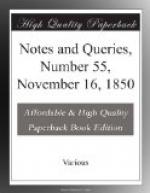Gaudentio di Lucca (Vol. ii., pp. 247. 298. 327.).—The Rev. Simon Berington, the author of The Memoirs of Gaudentio di Lucca, “of whom” MR. CROSSLEY (Vol. ii., p. 328.) “regrets that so little is known,” was the fourth son of John Berington, of Winesley, co. Hereford, Esquire, by Elizabeth, daughter of Sir Thomas Wolrich, of Dudmaston, co. Salop, Bart. He was born 1679. He studied and took holy orders at Douay College.
W.L.
Nov. 3. 1850.
Weights for weighing Coins(Vol. ii., p. 326.).—I am able to supply H.E. with a reference to this subject of an earlier date than those he quotes. In the MS. Compotus or Accounts of Sibton Abbey, in Suffolk, in my possession, occurs the following item, under the year 1363-4:
“Et de ix d. pro ij paribus Balaunces pro aure ponderand’.”
The following extract, although of later date than H.E. requires, may yet be not without its use to him in illustration of the subject. It occurs in the Compotus of a collegiate establishment at Mettingam, Suffolk, from an earlier volume of which some extracts were furnished to the Archaeological Journal (vol. vi. p. 62.). It is as follows, under the year 1464:—
“Item in ponderibus pro novo aura ponderant’ s’ nobili xs. di. nobyl et quadrant’ ejusdem cunagii et pro nobili de vjs. viijd. di. nobil et quadrant’ et minoribus ponderibus utriusque cunagii cum le Scolys et Cophino pro eisdem. ijs. jd.”
The new gold is of course the reduced coinage of Edward IV. I conclude that the nobles of 6s. 8d. were the same as the angels.
C.R.M.
Mrs. Partington (Vol. ii., p. 377.).—IGNORANS no doubt refers to the oft-repeated allusion to “Dame Partington and her mop;” and taking it for granted that he does so, I will enlighten him a little on the subject. The “original Mrs. Partington” was a respectable old lady, living, at Sidmouth in Devonshire; her cottage was on the beach, and during an awful storm (that, I think, of Nov. 1824, when some fifty or sixty ships were wrecked at Plymouth) the sea rose to such a height as every now and then to invade the old lady’s place of domicile: in fact, almost every wave dashed in at the door. Mrs. Partington, with such help as she could command, with mops and brooms, as fast as the water entered the house, mopped it out again; until at length the waves had the mastery, and the dame was compelled to retire to an upper story of the house. I well recollect reading in the Devonshire newspapers of the time an account similar to the above: but the first allusion to the circumstance was, I think, made by Lord Brougham in his celebrated speech in the house of Commons on the Reform Bill, in which he compared the Conservative opposition to the bill to be like the opposition of “Dame Partington and her mop, who endeavoured to mop out the waves of the Atlantic.”




